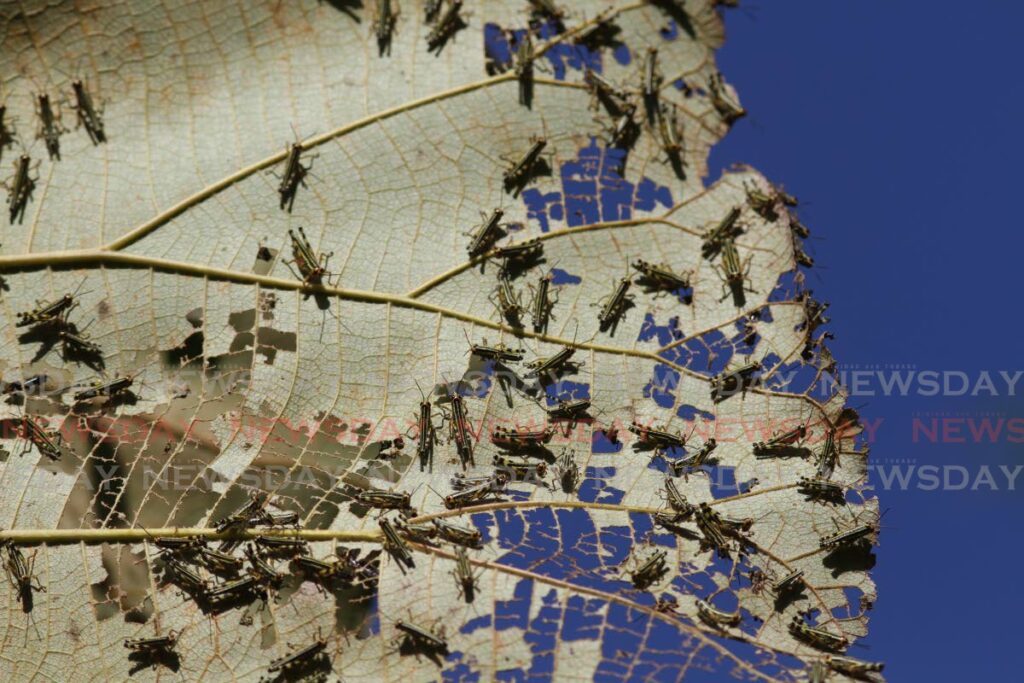Ministry: Spray Penal grasshoppers with soapy water

The Agriculture, Land and Fisheries Ministry's director of regional administration (south) David Ram, said the ministry is addressing the grasshopper outbreak in Penal and environs.
Since news of the outbreak a few days ago, Ram said workers have been spraying forested areas away from residential areas to try to get to the source of the problem. He referred to the insects as a nuisance.
People often use "locusts" and "grasshoppers" interchangeably, but Ram explained the difference, saying the insects that have been driving residents to stay indoors and damaging crops and plants in Penal and environs were Moruga grasshoppers.
"Locusts are a global problem and we have not been able to eradicate it. I say locust, but these are grasshoppers that behave like locusts," Ram told Newsday.
"A grasshopper moves by itself. These are a special type of grasshoppers that move in swarms.
"Locusts normally swarm; grasshoppers do not. But these are grasshoppers that swarm. They are grasshoppers that behave like locusts by moving together in large numbers."
Ram said these pests do not pose any risk to people "except being a nuisance. They do not bite. They would sit on people and land all over.
He warned that the recommended chemical the ministry uses to spray is propoxur, which is highly toxic. For that reason, spraying is done away from populated areas.
"If people, especially children, inhale it, they can become sick. The ministry sprays the outskirts where it would not affect residents. Some people have uncovered tanks and barrels. The chemical can contaminate and poison the water."
Ram added, "Over the years, the residents have been informed. They know it is dangerous to their own health. We cannot spray people's houses."
Ram called on residents to take steps to get rid of the pests too.
These include using aerosol spray or soapy water, dishwashing liquids, or liquid detergents. People should also keep their doors and windows closed, as the insects tend to keep moving.
"At this early stage, they are only hopping. They are not flying as yet. Now is the right time to get them, but when they emerge so close to households, there is nothing we can do in the households. We tell residents this year after year," Ram reiterated.
He said the ministry cannot predict when the unwanted insects would go for good.
"We have to monitor, because if there is a laying site, one set could emerge one day and another set in a couple of days from the same site. It comes in waves. It will be there for a while," Ram said.
"What we try to do is get to the egg beds, but sometimes it is highly inaccessible due to the terrain in the forest. Officers have to contend with things like snakes and illegal activities."
Some factors that cause the pests to leave forested areas and go into residential areas include the clearing of lands in forested areas and climate change.
The affected area, which is a farming community, borders Barrackpore and Penal.
The spraying resumed on Thursday.
What is propoxur?
The US Environmental Protection Agency says propoxur is an insecticide that controls cockroaches, flies, mosquitoes, and lawn and turf insects.
Short-term exposure of humans to propoxur by ingestion can lead to cholinesterase inhibition of red blood cells, with mild cholinergic symptoms including blurred vision, nausea, vomiting, sweating and tachycardia.
It added that chronic (long-term) inhalation exposure has resulted in depressed cholinesterase levels, headaches, vomiting and nausea in humans.


Comments
"Ministry: Spray Penal grasshoppers with soapy water"